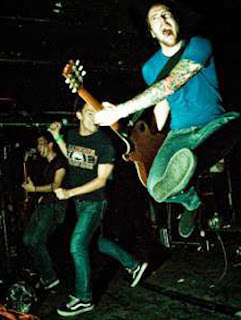The album is punk at its core, even as the band experiments with an alternative rock/pop sound. The change up, much like the revised lineup, has given the songwriting team of Stadt and guitarist Chris Browne more flexibility. It also keeps Stadt in the game much longer, with vocals that don't strain his voice after almost a decade of loud and gritty vocals.
Death Chorus is a more casual and caustic punk.
The breakthrough for the band on Death Chorus is in the writing. Whereas some people were taken aback by the opening single, Blood Balloon, it turns out to be a catchy opener that realigns the band toward something stronger.
The track itself might sing volumes about California, but it is really something nostalgic about upstate New York. For all the West Coast bleakness, Stadt admits it's more him than where he might be. The most telling line belts out "Romanticizing the past while the future is in full collapse." You can't go back because what you remember isn't there anyway.
Expect that kind of thinking all across Death Chorus. Despite the pop of Wlwycd, the song is as dark as it comes. The whole of it is all about tearing down the hope and expectations that others want to put on you. There is even a certain level of resentment tied up into it.
Stadt has never dug deep for such unnerving material, asking cheerily why he should live when he could die. Let the question echo in your head for awhile. It's less of a death wish and something more demanding, asking how dare those people expect great things after they found broken dreams.
In the face of such a big transition, the lyrics land like a hammer. Even for anyone who claims the Polar Bear Club has stepped out too far with a familiar pop-punk sound, it's clear they aren't listening closely enough. Besides, there are plenty of songs that serve up Stadt's timeless yells and howls from time to time.
For Show drops Stadt into a lower range and a dizzying pop-punk ballad. The mid-tempo stomper might even make it one of my most favorite tracks on the album. The lyrics are haunting and the delivery showcases almost everyone, especially Steve Port's drum work and Patrick Benson's guitar. The contribution on bass is more subtle, but outstandingly present.
Other standout tracks include the nostalgic Graph Paper Glory Days, upbeat When We Were College Kids, connective Twang (Blister To Burn), and the driving album closer Saw Blade. Upstate Mosquito is something of a surprise too. It's not just about a mosquito. It's about not having regrets, people who think the past is either better than it was or worse. They also poke fun at people who remove tattoos.
Not everything is immediately likable on Death Chorus (and some people might argue that nothing is salvageable, which is crap). But even where there are some missteps like the overly theatrical Siouxsie Jeanne, fans will find something in the lyrics of every song to sink their teeth into. For me, Chicago Springs is like that. It ties into other tracks on the album but felt listless as a standalone.
No matter. The bottom line is that Death Chorus is clearly more infectious than anyone would have guessed, anchored by solid writing and solid compositions. It's worth checking out.
Death Chorus By Polar Bear Club Survives 4.8 On The Liquid Hip Richter Scale.
I've always found Stadt and Browne to be at their best when they look back. Reflection, introspection, and nostalgia make up their most memorable tracks. What makes them so apt at it is their ability to reconcile everything.
You can find Death Chorus by Polar Bear Club on Amazon. The album is also available for order at Barnes & Noble or download it from iTunes. Polar Bear Club is currently working on its 2014 season. For updates when they break, visit the band on Facebook.
![Liquid [Hip]](https://blogger.googleusercontent.com/img/b/R29vZ2xl/AVvXsEjAFBQPqS7J0-rrttNoRYSsuwIePPZf4Nq6sqDioK1zzVQXJIQXKzq_NVNI4n6h3inuRQFBKOcJeZeSufkdHHIOxbSWyBjTjTxgKEQGyPzdwvkEEeECh4bI5YEGk4RWGUINSd7vulPQsCA/s1600-r/liquidhip.jpg)
